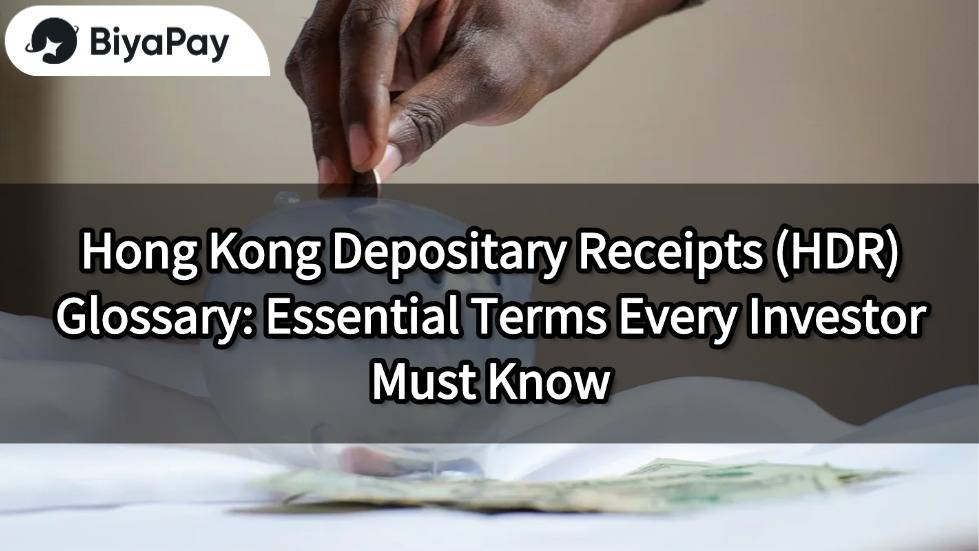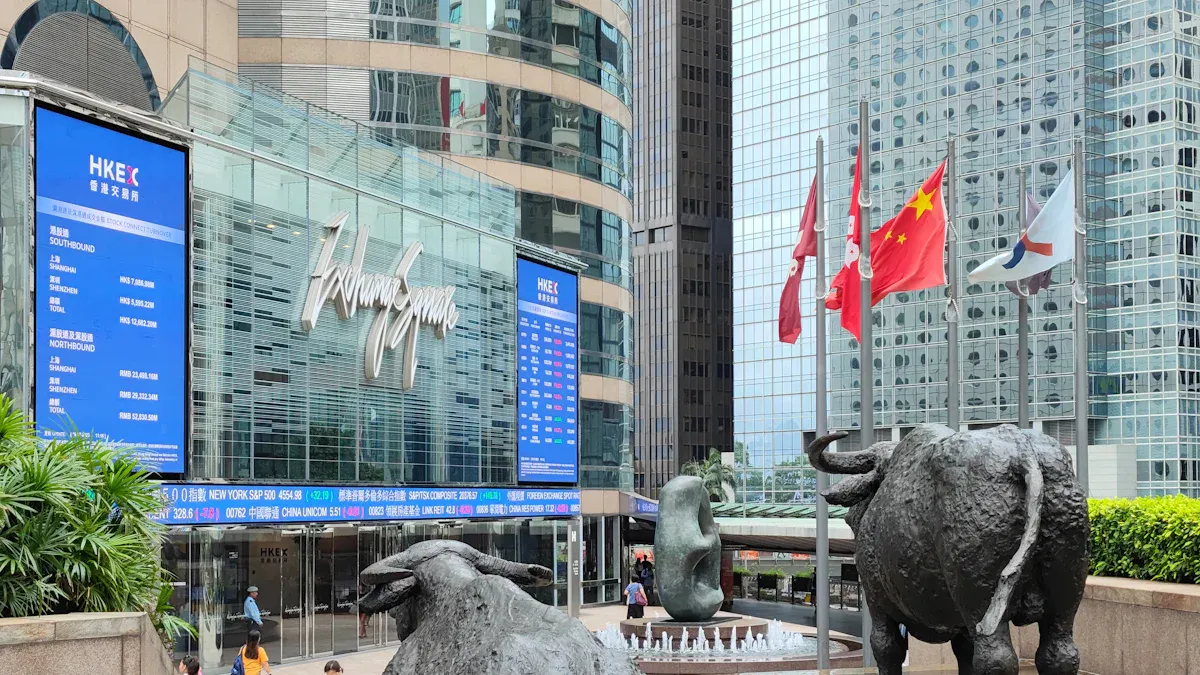- EasyCard
- Trade
- Help
- Announcement
- Academy
- SWIFT Code
- Iban Number
- Referral
- Customer Service
- Blog
- Creator
Hong Kong Depositary Receipts (HDR) Glossary: Essential Terms Every Investor Must Know

Image Source: pexels
Hong Kong Depositary Receipts (HDR) are a type of security listed on the Hong Kong Stock Exchange, representing shares of overseas companies. Investors use this method to participate in the growth opportunities of international firms. Properly understanding related professional terminology can enhance investment judgment. Different terms affect rights, risks, and returns, and investors should carefully study every detail.
Key Points
- Hong Kong Depositary Receipts (HDR) allow investors to buy and sell shares of overseas companies in HKD, facilitating participation in international markets and diversifying investment risks.
- When investing in HDR, it’s essential to understand the role of the custodian bank, related fees, and exchange rate risks, as these factors will impact final returns.
- Sponsored depositary receipts offer high transparency, and investors should prioritize them to protect their rights and reduce risks.
- The trading method for depositary receipts is similar to that of ordinary stocks, but liquidity and currency fluctuations can affect buying/selling prices and profits.
- Before investing, thoroughly read the depositary agreement to grasp details such as dividend distribution, conversion fees, and voting rights, enabling the formulation of an appropriate investment strategy.
Introduction to Hong Kong Depositary Receipts

Image Source: unsplash
HDR vs. ADR
Hong Kong Depositary Receipts (HDR) and American Depositary Receipts (ADR) both belong to the category of depositary receipts, but they differ in listing locations. HDRs are listed on the Hong Kong Stock Exchange, primarily allowing investors to participate in overseas company shares using HKD. ADRs, on the other hand, are listed on U.S. exchanges, with trading conducted in USD. Both represent shares of overseas companies, making it easier for local investors to engage in international markets. For example, large Chinese companies often choose to issue both HDRs and ADRs simultaneously to attract capital from different regions.
Operation Method of Depositary Receipts
The issuance process of depositary receipts involves an overseas company entrusting its shares to a designated bank, after which a Hong Kong or U.S. bank issues corresponding depositary receipts. Investors can buy and sell these securities on the exchange, with the trading method similar to that of ordinary stocks. The settlement process is jointly handled by the exchange and the bank to ensure the safety of funds and shares. If needed, investors can convert depositary receipts into original shares according to the depositary agreement, though this incurs a fee (approximately USD 10-20 per conversion, depending on the bank and exchange rate).
Investor Rights
When investors hold Hong Kong Depositary Receipts, they enjoy the same economic rights as the original shares, including dividend distributions and the right to be informed of company announcements. Some depositary receipts allow voting rights, but this depends on the issuance agreement. Investors are responsible for understanding related fees, taxes, and exchange rate risks. Experts recommend that investors regularly review issuer announcements to protect their rights.
Tip: Before investing in Hong Kong Depositary Receipts, it’s advisable to first understand the contents of the depositary agreement and related fees to avoid unnecessary losses.
Core Terminology Explained
Hong Kong Depositary Receipts (HDR)
Hong Kong Depositary Receipts (HDR) are securities listed on the Hong Kong Stock Exchange, representing shares of overseas companies. Investors can use HKD to buy and sell shares of foreign companies through HDRs. For example, a British company issuing HDRs in Hong Kong allows investors to participate in its growth on the Hong Kong market. HDRs enable local investors to more easily diversify their investment portfolios, reducing risks associated with a single market.
Fun Fact: The custodian for Hong Kong Depositary Receipts is typically a Hong Kong bank, responsible for safekeeping the original shares to ensure investor rights.
American Depositary Receipts (ADR)
American Depositary Receipts (ADR) refer to depositary receipts listed on U.S. exchanges, representing shares of non-U.S. companies. Investors trade in USD. Large Chinese companies like Alibaba issue ADRs in the U.S. to attract American capital. The custodian for ADRs is often a U.S. bank, responsible for holding the original shares. ADRs make it convenient for U.S. investors to participate in international markets, reducing the hassle of currency exchange.
GDR
GDR (Global Depositary Receipt) is a type of depositary receipt that can be traded in multiple countries. GDRs are typically listed on major European or Asian exchanges. Companies use GDRs to attract investors from different regions. For example, a Chinese company may issue GDRs simultaneously in London and Hong Kong to expand its funding sources. The issuance and settlement process of GDRs is similar to that of HDRs and ADRs, but their circulation range is broader.
Sponsored vs. Unsponsored
Depositary receipts are divided into sponsored and unsponsored types. Sponsored receipts are actively issued by the company in collaboration with a bank, offering more complete information disclosure. Unsponsored receipts are issued by banks on their own, often without company authorization, resulting in lower transparency. Investors choosing sponsored depositary receipts typically gain more company information and higher protection.
Expert Suggestion: Novice investors should prioritize sponsored depositary receipts to reduce the risk of information asymmetry.
Trading Method
The trading method for depositary receipts is similar to that of ordinary stocks. Investors can buy and sell depositary receipts through the Hong Kong Stock Exchange or U.S. exchanges. Trading hours, fees, and settlement rules align with local stock standards. For example, Hong Kong Depositary Receipts are traded in HKD, with settlement handled by the Hong Kong Securities Clearing Company. Investors can place orders via online brokerage platforms, flexibly managing their portfolios.
Dividend Distribution
Investors holding depositary receipts are entitled to receive dividends distributed by the company. Dividends are typically collected by the custodian bank, which deducts related fees before distributing them to investors. For example, if a company pays a dividend of USD 0.5 per share, the custodian bank may charge a service fee of USD 0.01 per share, then transfer the remainder to investors. Different national tax systems can affect the final amount received, and investors should be aware of relevant tax regulations.
Fees and Conversion
When holding depositary receipts, investors need to pay various fees, including custody fees, conversion fees, and transaction fees. If investors wish to convert depositary receipts into original shares, they must apply to the custodian bank and pay a conversion fee of approximately USD 10-20 per transaction (the exact amount depends on the bank and exchange rate).
Note: Frequent conversion of depositary receipts increases costs; investors should assess the necessity of conversion.
Liquidity
Liquidity refers to the trading activity of depositary receipts in the market. High-liquidity depositary receipts allow investors to execute trades at prices close to market rates. Liquidity is influenced by issuance size, investor participation, and market demand. For example, HDRs issued by well-known companies typically have higher liquidity, making buying and selling more convenient. Insufficient liquidity can widen bid-ask spreads, increasing transaction costs.
Currency Risk
Currency risk refers to the impact of exchange rate fluctuations on investment returns when depositary receipts involve different currencies. For example, if an investor buys Hong Kong Depositary Receipts in HKD but the company pays dividends in USD, a decline in the HKD/USD exchange rate will reduce the HKD amount received by the investor. Investors should closely monitor exchange rate movements and adjust their investment strategies accordingly.
Tip: Before investing, thoroughly read the depositary agreement to understand the custodian, trustee, and related fees, protecting your rights.
Investment Impacts

Image Source: pexels
Risks and Returns
Investing in Hong Kong Depositary Receipts involves various risk and return factors. High-liquidity depositary receipts allow investors to execute trades more easily at prices close to market rates, reducing bid-ask spread losses. Currency risk, however, can affect final returns due to exchange rate fluctuations. For example, if an investor buys HDRs in HKD but the company pays dividends in USD, a drop in the HKD/USD exchange rate will decrease the actual HKD amount received.
Investors also need to consider costs such as custody fees and conversion fees. These expenses directly impact investment returns. For instance, converting depositary receipts into original shares may incur a bank fee of USD 10 to 20 per transaction, depending on the exchange rate at the time.
Expert Suggestion: Investors should assess their risk tolerance and adjust their investment strategies based on market liquidity and exchange rate trends.
Considerations
Before investing, investors should thoroughly read the depositary agreement to understand the custodian, trustee, and related fees. Some depositary receipts do not offer voting rights, and investors need to confirm the scope of their rights.
Common pitfalls include ignoring currency risk, underestimating transaction fees, and overly relying on unsponsored depositary receipts.
- Investors should choose sponsored depositary receipts with high information transparency.
- Regularly review issuer announcements to stay updated on company developments.
- Assess market liquidity to avoid excessive price volatility due to insufficient trading volume.
Real-Life Case
An investor purchased HDRs of a British company on the Hong Kong Stock Exchange, with a share price of USD 10, and the HKD/USD exchange rate at 7.8 at the time. The company paid a dividend of USD 0.5 per share, with the custodian bank charging a service fee of USD 0.01 per share.
If the HKD/USD exchange rate drops to 8.0, the HKD amount received by the investor will decrease. Additionally, if the HDR has low liquidity, the investor may need to sell at a price below market value when exiting, affecting the final return.
This case demonstrates that currency risk, liquidity, and fees all directly impact investment deployment and returns. Investors should comprehensively evaluate these factors to formulate an appropriate investment strategy.
Mastering Hong Kong Depositary Receipts and related terminology can enhance decision-making quality for investors. In the future, with increasing market volatility, interest rate trends, inflation indicators, and diversified allocation strategies will become important references.
- Flexible allocation of stocks and bonds can aid in risk management.
- Observing market volatility indices and economic growth mechanisms can help seize more opportunities.
Continuous learning of professional information can reduce investment risks and enhance return potential.
FAQ
How Are Depositary Receipts Different from Ordinary Stocks?
Depositary receipts represent shares of overseas companies and are listed on the Hong Kong Stock Exchange. Ordinary stocks belong to local companies. Depositary receipts involve exchange rate and custody fees, which ordinary stocks do not.
What Fees Should Investors Watch Out for When Investing in Hong Kong Depositary Receipts?
Investors need to pay custody fees, conversion fees, and transaction fees. For example, conversion fees are approximately USD 10 to 20 per transaction, with the exact amount depending on the bank and exchange rate.
Can Depositary Receipts Be Converted to Original Shares Anytime?
Investors can apply to convert depositary receipts into original shares. The custodian bank will charge a conversion fee and process it according to the depositary agreement; the time and conditions should be checked in relevant documents.
How Are Dividends Distributed for Depositary Receipts?
The custodian bank will collect dividends on behalf of the company, deduct service fees, and distribute them in HKD. The final amount is affected by the USD/HKD exchange rate, and investors should be mindful of exchange rate fluctuations.
What Are the Main Risks of Investing in Depositary Receipts?
Depositary receipts carry currency risk, liquidity risk, and information transparency issues. Investors should assess their risk tolerance and choose products with robust information disclosure.
Hong Kong Depositary Receipts (HDRs) offer a gateway to global markets, but high cross-border transaction fees, complex overseas account setups, and currency exchange risks can deter investors, especially those in the PST time zone facing coordination challenges. BiyaPay simplifies this by enabling direct trading of U.S. and Hong Kong stocks without cumbersome overseas accounts,. Its multi-asset wallet supports fee-free conversion of USDT to multiple fiat currencies like USD and HKD, with cross-border remittance fees as low as 0.5%, minimizing costs. A 1-minute BiyaPay account registration unlocks fast, secure access to global markets, empowering you to manage currency risks and seize HDR opportunities in 2025.
Start your global investment journey! Join BiyaPay.
*This article is provided for general information purposes and does not constitute legal, tax or other professional advice from BiyaPay or its subsidiaries and its affiliates, and it is not intended as a substitute for obtaining advice from a financial advisor or any other professional.
We make no representations, warranties or warranties, express or implied, as to the accuracy, completeness or timeliness of the contents of this publication.




Contact Us
Company and Team
BiyaPay Products
Customer Services
is a broker-dealer registered with the U.S. Securities and Exchange Commission (SEC) (No.: 802-127417), member of the Financial Industry Regulatory Authority (FINRA) (CRD: 325027), member of the Securities Investor Protection Corporation (SIPC), and regulated by FINRA and SEC.
registered with the US Financial Crimes Enforcement Network (FinCEN), as a Money Services Business (MSB), registration number: 31000218637349, and regulated by FinCEN.
registered as Financial Service Provider (FSP number: FSP1007221) in New Zealand, and is a member of the Financial Dispute Resolution Scheme, a New Zealand independent dispute resolution service provider.




















